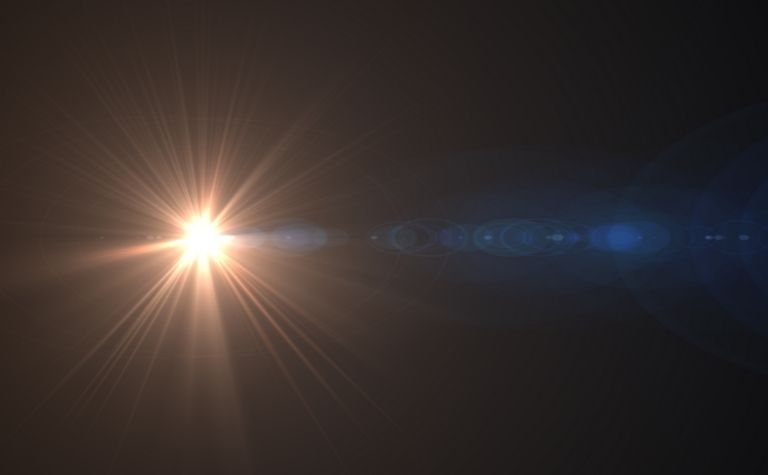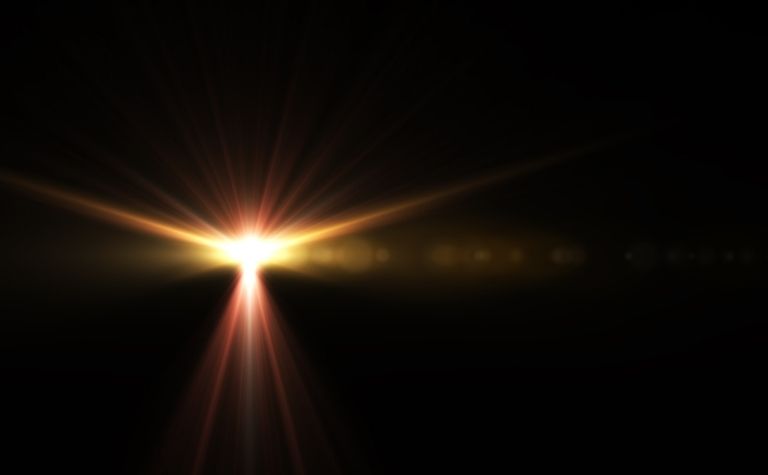The Bible teaches that God didn’t use already-existing matter to create the universe but spoke into existence what he willed (John 1:3; Col. 1:16). The first chapter of Genesis sequentially describes the seven-day creation account. What God created on the first day of creation had an important purpose and set the stage for everything he called into being after it.
God created light on the first day of creation. Most Bible scholars argue that it was a natural light that had a supernatural source, as God didn’t create the sun and moon under the fourth day. Some scholars also believe God created angels on the first day, though Scripture doesn’t clearly affirm this.
How did light simply appear? What was the nature of the light? How does the light relate to eternity? Why do some scholars believe that God created angels on the first day? Keep reading to learn the answers to these questions and others.
Also see Where Was the Garden of Eden Located? to learn more.

Let There Be Light: What God Created On Day One
Before the “beginning” mentioned in the first verse of the Bible, there was God. But then, as one Genesis scholar writes, “The divine word shatters the primal cosmic silence and signals the birth of a new cosmic order.” [1] The elements of the universe that came into being from the first day to the sixth day originated in God’s sovereign, sanctified, and spoken word.
Prior to the first day, Genesis reveals that the earth was “without form and void.” The Spirit of God hovered over the unfashioned waters, and “darkness was over the face of the deep” (Gen. 1:2). God pierced the unilluminated world on the first day, breaking up the permanent blackness that blanketed the earth.
Genesis 1:3 reads, “And God said, ‘Let there be light,’ and there was light.” In the book of Isaiah, God said that his word “shall not return to me empty, but it shall accomplish that which I purpose, and shall succeed in the thing for which I sent it” (55:11).
The first day of creation, as well as the other days in the creation account, illustrates this reality because what God speaks into being immediately and obediently comes into existence.
Preparation and completion
The creation account also exhibits a clear structure of preparation and completion. In this way, the first day uniquely corresponds to the fourth day. The light God created looked ahead to the sun and other stars that radiate light and the moon that reflects it.
| Preparation | Completion |
|---|---|
| “without form” (Gen. 1:2) to form | “void” (Gen. 1:2) to fullness |
| Day 1: God created light, separating it from darkness (v. 3-5) | Day 4: God placed luminaries in the heavens (v. 14-19) |
| Day 2: God created the expanse, separating the waters above it from the waters below it (v. 6-8) | Day 5: God placed fish and birds in the sky and seas (v. 20-23) |
| Day 3: God created land and vegetation, separating the waters below the expanse into seas (v. 9-13) | Day 6: God placed people and animals on the land (v. 24-31) |
The light was good
“And God saw that the light was good. And God separated the light from the darkness” (Gen. 1:4). The pleasure God has in what he makes, expressed in the statement that it was “good,” starts a pattern that is repeated throughout the creation account. The physical universe, before sin entered the world, was good and pleasing to God.
The light and dark together created a day. Genesis 1:5 reads, “God called the light Day, and the darkness he called Night. And there was evening and there was morning, the first day.”
Darkness, however, wasn’t banished from the universe when God created light. Night won’t cease to exist until the end of time. Revelation 22:5 reads, “And night will be no more. They will need no light of lamp or sun, for the Lord God will be their light, and they will reign forever and ever.”
Also see Who Wrote the Book of Genesis? to learn more.

What was the nature of the light God created?
Most Genesis scholars believe that the light God created on the first day was natural. Yet there is some mystery to the description because God hadn’t created the sun, moon, and stars. The light God made on the first day likely had properties similar to the light that other celestial bodies would later produce. Yet its source and sustaining power was supernatural.
Is the light physical or supernatural?
One Genesis scholar writes, “The light was natural, physical light.” [2] Another explains that natural light is possible apart from celestial bodies. “Light is a form of energy that and may be produced in many different ways, not just by sun and stars (which were not created until the fourth day).” [3] Yet many scholars believe the light signifies much more than the first existence of a physical property.
Old Testament scholar Allen Ross writes, “It is natural, physical light; but it is much more. The Bible shows again and again that light and darkness signify mutually exclusive realms, especially in spiritual matters of good and evil. Throughout Scripture light is the realm of God and the righteous; darkness is the domain of the Evil One and death.” [4]
What is the source of the light?
God, not the sun, is the source of the light from the first day through the third day. Genesis scholar Kenneth Mathews writes, “Since it is not tied to an illuminating body such as the sun (vv. 15-16), the text implies that the ‘light’ has its source in God himself.” [5]
Mathews believes this may be why the Psalmsist describes God as light, followed by a description of celestial bodies. “The Lord wraps himself in light as with a garment; he stretches out the heavens like a tent” (Psa. 104:2).
Similarly, the prophet Habakkuk describes God as light. “His splendor covered the heavens, and the earth was full of his praise. His brightness was like the light; rays flashed from his hand; and there he veiled his power” (3:3b-4).
God is light
The New Testament also teaches that God is light, which refers to the person and work of Jesus Christ who pierces the darkness of the human heart.
- 2 Corinthians 4:6, “For God, who said, ‘Let light shine out of darkness,’ has shone in our hearts to give the light of the knowledge of the glory of God in the face of Jesus Christ.”
- John 8:12, “Again Jesus spoke to them, saying, ‘I am the light of the world. Whoever follows me will not walk in darkness, but will have the light of life.'”
- 1 John 1:5, “This is the message we have heard from him and proclaim to you, that God is light, and in him is no darkness at all.”
God’s light will shine forever
The Bible teaches that the light of God will shine forever.
Isaiah explains: “The sun shall be no more your light by day, nor for brightness shall the moon give you light; but the Lord will be your everlasting light, and your God will be your glory. Your sun shall no more go down, nor your moon withdraw itself; for the Lord will be your everlasting light, and your days of mourning shall be ended” (60:19-20).
The prophet Zechariah gives readers a similar description: “And there shall be a unique day, which is known to the Lord, neither day nor night, but at evening time there shall be light” (14:7).
Likewise, John writes in Revelation that “night will be no more. They will need no light of lamp or sun, for the Lord God will be their light, and they will reign forever and ever” (22:5).
Also see How Long Did It Take Noah To Build the Ark? to learn more.

Did God create angels on the first day?
When did God create angels? Many people ask this question, but the Bible doesn’t explicitly answer it. Angels haven’t always existed, so they have a beginning; it’s just unclear when that was.
Some scholars are more certain than others in theorizing that God created them on the first day. Other suggestions are that God created them on the fourth day since the Bible often likens them to celestial luminaries. Finally, others think God may have created them on the sixth day because that’s when he made people who angels serve (cf. Heb. 1:14) in addition to God.
Angels worshipped God when he created the universe
The book of Job reveals that the angels worshipped in response to God’s creation of the universe, which implies that they existed at that time.
In the passage, Job refers to angels as “sons of God.” He writes, “Where were you when I laid the foundation of the earth? Tell me, if you have understanding. Who determined its measurements—surely you know! Or who stretched the line upon it? On what were its bases sunk, or who laid its cornerstone, when the morning stars sang together and all the sons of God shouted for joy?” (38:4-7).
According to some scholars, Psalm 104:2-5 hints at when God created angels. After describing God as light, and his creation of the heavens, as in the celestial bodies, the passage mentions angels who are referred to as “messengers” and “ministers.”
“Covering yourself with light as with a garment, stretching out the heavens like a tent. He lays the beams of his chambers on the waters; he makes the clouds his chariot; he rides on the wings of the wind; he makes his messengers winds, his ministers a flaming fire. He set the earth on its foundations, so that it should never be moved.”
What can readers take away from Psalms and Job since they are poetic descriptions? Genre or literary style, such as narrative, proverb, and poetry, is important when interpreting Bible passages in the Bible. Since Psalms and Job are poetic in nature, can readers take away anything literal from their descriptions?
Bible scholar Douglas Kelly believes so. “These passages from Psalms and Job are certainly poetic, and presumably are not meant to be interpreted in the same precise, chronological sequence required by Genesis 1 and 2. Poetic though its literary form is, it must mean something, and bear reference to a true state of affairs. Such passages may take us as far as we can go safely in the consideration of the question: when were the angels first created?” [6]
The first day is an excellent educated guess for when God created angels, but readers of all perspectives would be wise to admit that the Bible doesn’t explicitly answer the question.
The Creation Account: Table of Contents
Readers are welcome to read follow the links below to learn more about the seven-day creation account in Genesis. For convenience, this table of contents is found at the conclusion of each article in the series.
| 7 Days of Creation |
|---|
| What did God create on the first day? (see above) |
| What did God create on the second day? |
| What did God create on the third day? |
| What did God create on the fourth day? |
| What did God create on the fifth day? |
| What did God create on the sixth day? |
| What did God do on the seventh day? |
Also see How Long Was Noah In the Ark? to learn more.
References:
[1] Genesis by Nahim Sarna. p. 7.
[2] “Genesis” in The Bible Knowledge Commentary. p. 28.
[3] “Genesis” in the New Bible Commentary. p. 60.
[4] Creation and Blessing by Allen Ross. p. 108.
[5] Genesis 1-11:26 by Kenneth Mathews. p. 145-146.
[6] Creation and Change by Douglas F. Kelley. p. 118-119.
Related Questions
A serpent plays an important role in Genesis, the first book of the Bible, and in Revelation, the last book. Scripture also mentions them in other places in the Old and New Testaments that are...
Noah's ark still fascinates Bible readers several millennia after its voyage because of its important purpose, enormous size, and the human and animal passengers it carried. Animals are a special...
